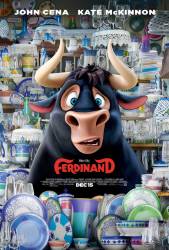
Question: Ferdinand had his name since birth when he is being raised at the bull camp. But he is later adopted by Nina and Juan who also name him Ferdinand. How do they know that his name is Ferdinand? He was not wearing any identification tags and he couldn't speak to the humans to tell them this.

Question: At the very beginning of the film, young Henry boards the Flying Dutchman to speak to Will. When Will looks behind him, he sees the shadows of several crew member starting to make their way towards him and he suddenly gets frightened that the crew will see Henry. Why would he react this way? Since he's captain of the Flying Dutchman, if his men saw Henry, Will could order them to leave Henry alone.
Answer: He's probably worried that either the crew will attack or at very least frighten Henry. Or he just doesn't want Henry to see how horribly the curse can affect people.
But because Will is ferrying souls to the after life, like Davy Jones should have done for the full time, he was captain of the Dutchman. There is no curse that would make the men look like sea monsters. They only started to look like that because Jones denied his duties after 10 years of service, when Calipso didn't show up. So the crew would look like normal men, so Will being worried that Henry will be frightened by them, can't be the reason he started to panic.
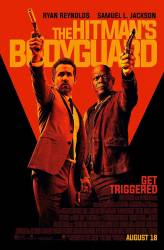
Question: In the beginning of the movie there is a man recounting his story about how his wife and child were killed by Dukhovich. The opposing attorney objects due to hearsay. How is this hearsay, when the man was telling his story of him seeing his own family killed?
Answer: You are right. It isn't hearsay and this is a mistake.
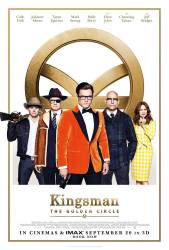
Question: When Merlin stepped on the land mine, why didn't he just wait there until Eggsy and Harry completed the mission? Surely he could have just stood there, then later on they could have called in bomb experts or use Statesman resources to get him off that thing? Eggsy and Harry could have easily taken out those 5 guards.
Answer: At the time, these people only had a really short time to save the world. Merlin thought that, with the landmine, he could sacrifice himself along with many guards to save the world.
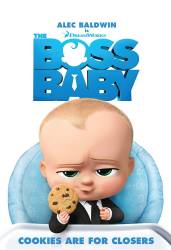
Question: I find the logic in this movie confusing! How can the mom be pregnant with Boss Baby while he's in Baby Corp? How did he get out of the taxi walking and dancing to the door without the parents noticing yet enter the house with him in their arms? Are babies Suzie, the triplets, and Jimbo also from Baby Corp since they talk and act like Boss Baby? If Suzie is from Baby Corp, would she lose her formula after being "accepted" into kindergarten with a picture of a smiley face? If the Boss Baby quits his job to be part of the Templeton family again, wouldn't he have ended up with some other family unintentionally? Finally, if the Boss Baby came back as a regular baby, why wasn't the mom pregnant?

Question: After finishing the game, did Spencer, Fridge, Bethany, and Martha still have detention or did changing the timeline prevent them from their punishment?
Answer: They still had detention. The only thing that changed was Alex. But since they had become such close friends, detention would hardly be a punishment for them anymore.
It seemed like they just simply walked out of detention. I mean, did they finish their detention or did they have to continue on a Saturday?
The movie doesn't explain. But regardless, it also really doesn't matter.
They probably didn't go back on Saturday. When they go back to school, Spencer acts like he hasn't spoken to Martha since their adventure, while Bethany says she's been texting Martha 'all weekend'.
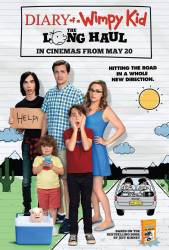
Question: Why didn't Greg simply apologize to Mr. Beardo and explain everything to him?
Answer: "Beardo" looked intimidating and could easily frighten a child (or adult, for that matter). He also became enraged in front of children over scratches on his van - something minor that might bother an adult, but certainly not serious enough to produce Beardo's over-reaction. Greg did deny that he caused the damage. However, Beardo did not come across as being a rational adult or someone who a 12-year-old would feel comfortable standing up to or simply trying to reason with. Greg saw Beardo as a "difficult" and irrational person, so rightfully wanted to get away from him as soon as possible.
Answer: Mainly because when they first actually meet, the Beardo's daughter blames everything on Greg, so even if Greg did try to explain everything, the Beardo probably wouldn't believe him.
Answer: There's probably a combination of factors why Greg kept things to himself. Teenagers don't tell parents a lot of things for whatever reasons (e.g, not worth the hassle). Maybe Greg thought his parents wouldn't believe his side of the story and assume he was the instigator. Perhaps Greg's parents gave the boys a stern warning to behave themselves while on vacation - that they need/ want rest and relaxation or care-free days without trouble, especially from the boys (trying to avoid the "can't you even behave yourselves on vacation" lecture). Believing "ignorance is bliss", Greg figured what his parents didn't know couldn't hurt them. Telling his parents may not have been helpful or relevant; Beardo was acting like a lunatic or psycho on each encounter. It might have been difficult, if not impossible, to tell his parents without Rodrick overhearing. Some of the things Greg did (getting into bed with Beardo) were embarrassing; if Rodrick knew, they'd become the brunt of his teasing.

Question: What happened to King Herod after his soldier falls to his death and both Thaddeus and Rufus reform?
Answer: He continued ruling with an iron fist. The prophecy of the blessed child was forgotten until Jesus came forth.
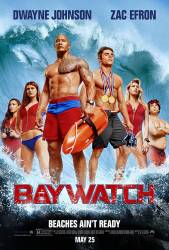
Question: Did Pamela Anderson's cameo scene hint at a sequel or was it a nod to the original show?
Answer: A nod to the original show.
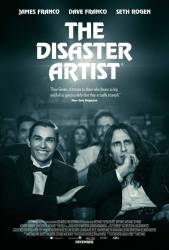
Question: The producer in the restaurant scene, played by Judd Apatow, who rudely tells Tommy that he's never going to make it big - was he a real person? If so, did he ever see "The Room" and bump into Tommy since?
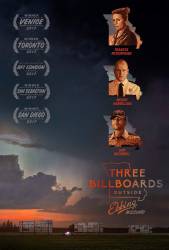
Question: Why would they make Anne Australian? Her nationality isn't even mentioned, so why would they let Abbie Cornish use her natural accent? What purpose does it serve? It seems like an incredibly random choice. Abbie Cornish has used an American accent in most of her roles, so of all the ones to use her natural accent, why would she use it in the one where it makes the least sense? Why would an Australian go to a small Ozarks Missouri town? I assume she stayed there because she met Bill and fell in love with him, but why would she have gone there in the first place, before she met Bill?
Answer: Since the movie doesn't tell us how she and Bill met, any answer about how and why she was there would be mere speculation. Letting an actress speak in her native accent is not exactly "random"; random would be if she was an American and the writer/director decided to make her character Australian. However, the situation of an Australian marrying someone from, and then living in, a small Missouri town is not as outlandish or nonsensical as one might think; I used to date someone from a tiny town in Kansas, whose mother was an upper-class British woman who happened to meet and marry someone from that town.
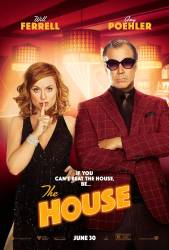
Question: Is there any indication how much of this film was unscripted or how much Amy and Will improvised their lines. I can't tell if it's just the acting style the actors chose, or if it was the way the director wanted it, but a lot (especially the opening scenes) comes across as bad improv. Or am I the only one that gets that vibe?
Answer: A lot of the time with modern comedies, they'll usually do a scene as written, then do a number of improv takes where the actors and director come up with jokes on the fly. Then in editing, they'll pick the (presumably) best bits from both the scripted and improv takes to put into the finished film. And Will Ferrell confirmed that there was indeed a lot of improvising on-set of "The House." Unfortunately, without a copy of the shooting script, it's basically impossible to tell exactly how much of the finished film is made up of the unscripted improv. But it's fair to say that at least a decent chunk of the movie was made up of improv comedy. So chances are it's not just you.
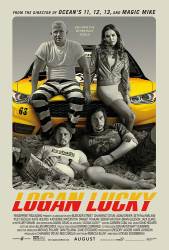
Question: What was the purpose of Channing Tatum preventing the gate from opening?
Answer: Jamming the gate by blocking the sensor delayed Joe Bang's brothers long enough for Mellie to come and collect some bags full of cash. Jimmy specifically did not trust them to know his entire plan. This part of the ruse allowed them to steal a separate stash of money so they could pretend to return the stolen money, whilst secretly keeping some to distribute later.

Question: As a non-native English speaker, I ask: At the dinner, Jim says to his boss, "I was thinking, with the numbers so high, maybe it's time I get off the road and take an office position." What occupation did he have? And what does he mean "get off the road" here?
Chosen answer: I don't know what his specific occupation was, but the term to "get off the road" would refer to someone who constantly travels, either domestically or internationally, for their job, but they now want to work in their company office every day. The most common trope would be the "traveling salesperson" who was constantly "on the road," going town to town, selling their product.
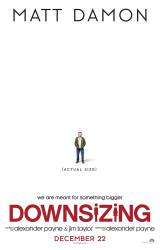
Question: For no obvious reason - except for the fun of it - the downsizing procedure included a complete shave-down. In the Norwegian colony they have horses, sheep and dogs. Were the animals also shaved before being downsized?
Answer: They apparently shave them because the process only works on living tissue. So yes, they would have had to shave the animals.
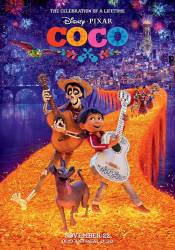

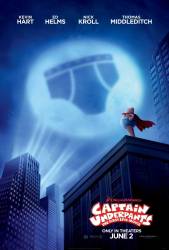
Answer: It's a very common Hispanic name, so probably just a coincidence that Nina and Juan happened to name him that.
raywest ★